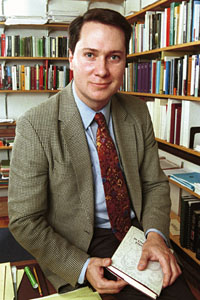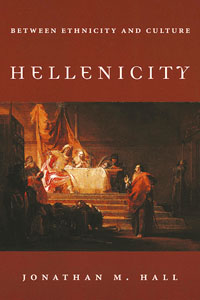Hall’s Hellenicity wins Press’ Laing Prize
By Jennifer CarnigNews Office
 Jonathan Hall, Professor and Chair of Classics, has won the 2004 Laing Prize for his latest book, Hellenicity: Between Ethnicity and Culture.  | |
At its award ceremony Thursday, April 28, the University Press awarded the 2004 Gordon J. Laing Prize to Jonathan Hall, Professor and Chair of Classics, for his book Hellenicity: Between Ethnicity and Culture.
Awarded annually by the Press since 1963, the Laing Prize is given to the Chicago faculty member author, editor or translator of a book published during the preceding three years that adds the greatest distinction to the list of the University Press. It is named for Laing, who served as Editor of the Press for more than 30 years and established its reputation as the premier academic publisher in the United States.
In Hellenicity, Hall puts ancient Greece in conversation with today’s cosmopolitan world, where ethnic identity has assumed an ever-increasing importance. But how is this identity formed, and how does it change over time? Hall explores these questions in the context of ancient Greece, drawing on an exceptionally wide range of evidence to determine when, why, how and to what extent the Greeks conceived themselves as a single people.
Hall argues that a subjective sense of Hellenic identity emerged in Greece much later than is normally assumed. For instance, he shows that the four main ethnic subcategories of the ancient Greeks—Akhaians, Ionians, Aiolians and Dorians—were not primordial survivals from a premigratory period but emerged in precise historical circumstances during the eighth and seventh centuries B.C.E.
Furthermore, Hall demonstrates that the terms of defining Hellenic identity shifted from ethnic to broader cultural criteria during the course of the fifth century B.C.E., chiefly due to the influence of Athens, whose citizens formulated a new Athenoconcentric conception of “Greekness.”
President Randel presented the award at the ceremony and praised Hall for his important scholarship. But Hall turned around and lauded the University and the Press instead. He explained that Hellenicity was originally to have been published by Cambridge University Press but that he switched publishers after Cambridge refused to publish—contrary to the strong recommendation of its academic referees—a manuscript about local and national identities in a small Macedonian Village.
Cambridge rejected the work, written by Wellesley College anthropologist Anastasia Karakasidou, but the University of Chicago Press “defended the academic freedom of a young scholar,” Hall said, by commissioning and publishing the manuscript under the title Fields of Wheat, Hills of Blood: Passages to Nationhood in Greek Macedonia (1997).
Hall ended his speech by urging the Press not to allow the current trend toward publishing introductory volumes, companions and anthologies to divert scarce resources from commissioning and promoting original, cutting-edge monographs, especially those written by the next generation of academic authors.
Hellenicity was Hall’s second book. His first publication, Ethnic Identity in Greek Antiquity (1997), was concerned with establishing methodological possibilities and limitations for the study of ethnicity in Greek antiquity. For that work Hall earned the Charles J. Goodwin Award for Merit from the American Philological Association for best book in the field. He was the youngest scholar ever to receive the distinction.
Hall came to the University in 1996 from the University of Cambridge where he earned his doctorate in 1993. He also studied at the University of Oxford where he received his B.A. in 1988 and M.A. in 1991. He is currently at work on his next book, The Blackwell History of the Archaic Greek World.
![[Chronicle]](/images/sidebar_header_oct06.gif)